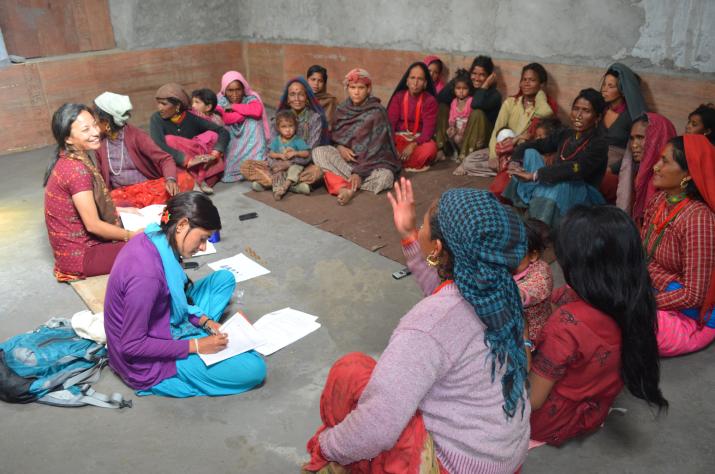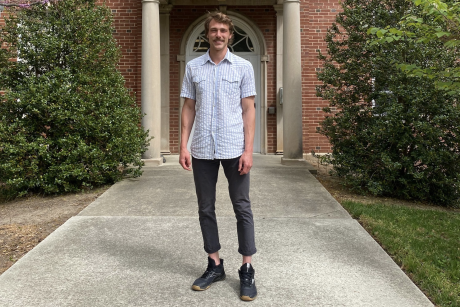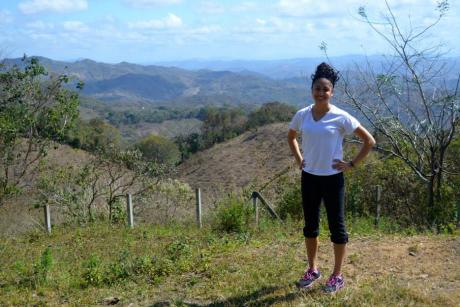
Focus Group Discussion (FGD) with Dalit women farmers in Jumla, Nepal.
Published June 23, 2014, last updated on October 5, 2017 under Voices of DGHI
By Libby MacFarlane, MSc-GH student
How can research be viable long-term? And can it ever be?
I sat on the porch looking out as the setting-sun reflected on the rice paddies between the contours of the mountains. Dust swept up in a cloud as the kids played soccer in the field next door and the wondrous smells of dahl bhat and vegetables wafted up from our kitchen below. Bells around the donkeys’ necks clanked in rhythm as the herd sauntered past down the dirt road. It was the dinner bell calling.
Reciprocity & research
Nanda Raj (our host and local research collaborator), Renu (my research assistant) and I gathered round the table. After initial “how was your day” and “FGD recap”, our conversation turned more serious and reflective. Nanda Raj shared openly about his experience with foreign researchers. He met Brandon Kohrt (my advisor) 15+ years ago in Jumla and they have built a beautiful friendship (“like brothers” Nanda Raj says) and a positive working relationship together. I remember when I became familiar with Brandon’s work, I was impressed and humbled by his dedication to this place, serving the work and his generosity along the way. Nanda Raj has said before how absolutely grateful he is for the many ways Brandon has supported him personally and by extension the people of Jumla including - counselor training, further education, personal and family support and helping build a counseling center in town. If I had a model example of reciprocity and research, it would be this partnership – a key component, I think, to build a model of sustainable research.
Over-saturation, over-extraction- the potential burdens of an increasing research footprint
Now at the table, we began to unpack and explore the complexities of this collaboration. Nanda Raj shared that over the past 15 years of doing research there has been an increasing number of researchers (from various universities) in the area, thus increasing the research footprint. Despite good intentions, Jumla is oversaturated and over-extracted. As a result, people here feel a burden and also a longing: what happens to the data? And why aren’t we benefiting from it?
A kinked research chain – the importance of reflecting back findings
I have heard this time and again here in Jumla that participants want the research findings reflected back to them. They want to see results in order to know that their time and effort are being put to “good use”. It is clear that they want lasting interventions and innovations rather than token gifts of tea and soap. I recognize that I am hearing from a small number of people (and nearly all second hand), and this is only one side of the story. Perhaps there have been attempts at reflection. But isn’t it the perception of the people of Jumla that matters most? If people feel taken advantage of, then don’t we (as researchers) need to reflect on and modify our behavior? Now this is not to say this is how everyone feels, and of course the research chain is kinked and complicated at times.
Communication, compensation, expectation
This leads me back to the questions I originally posed: Can research ultimately lead to sustainable outcomes for the people being studied? How can research (and researchers) reciprocate and give back? And how can the findings inform and empower? These questions and the role of the researcher have been things I have struggled with during my first year in the Master of Science in Global Health program at Duke. My mind goes back to Tuesday afternoons in the spring during our research ethics class where we had stimulating and challenging discussions about these questions in the context of doing research abroad. What expectations can I/we set and what can we meet? What do I/we communicate and how do we compensate? So is it about reframing? Is it about integrating training? Is it simply about listening better or listening more?
Balancing the essential elements of participatory research
I am a believer in Community-Based Participatory Research (CBPR) – which is why I am using Photovoice as a qualitative data collection method this summer. Two of the key elements to success of this research are time and investment in a place. To do this well, I know that I must get to know the community, build trust, build resilience and support community capacity development. In the Photovoice course I took at UNC this past spring we learned this again and again. This leads me to the crux of my dilemma: how in a summer is it possible to conduct truly participatory research? Research that sustains and contributes? It seems nearly impossible to do so. So what can I do as a researcher with this limited time that is both rooted in good methodology and best practice (from a research stand-point) and rooted in promoting the community’s wants and needs?
A call to action
What I took away from our conversation that evening on a porch next to a paddy field in Jumla was that something needs to be done. This is certainly not to devalue the work of the past 15 years. Many things have been built up, but some things have broken down. We need to look at the full glass of realized undertakings as well as the shards of false promises. And what I am hearing is that the brunt of these unrealized expectations and promises gets placed on the messenger. In this case, Nanda Raj.
Candor, transcendence, attunement
I feel so fortunate that Nanda Raj has shared these complexities, difficulties and lessons learned with us. It is through this open communication that we can transcend and even avoid some of these problems. Conversations like these are invaluable to my understanding, awareness and attunement to the situation here in Jumla. And maybe, that’s just it. Maybe we just need to be more aware and attuned as researchers?
Hopeless into hopeful, research into practice
I left the table that evening with a full stomach and a heavy heart. I can’t help but feel a bit hopeless. I am optimistic this feeling can transform into hope. Hope that we can better leverage the amazing work that is being conducted around the world in the field of global health and will be put it into practice. Hope that we can listen, not to our preconceived notions, but to what the community wants and needs. And hope for appropriate and sustainable interventions and policies that are developed in collaboration with the community, researchers, policy-makers and global health partners.


